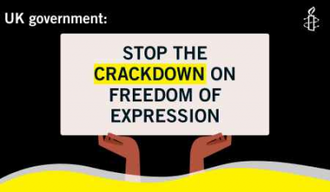Open letter to PM on government plan to restrict demonstrations

Source: Amnesty International
The Amos Trust, Christian Aid, Embrace the Middle East, The Fellowship of Reconciliation and Quakers are among dozens of organisations who have signed a letter to Prime Minister Rishi Sunak opposing government proposals to restrict protests. They write:
To the Prime Minister,
RE: Government proposals to crack down on the right to protest and free expression
We, the undersigned, write with great concern about recent proposals that will further restrict the rights of everyone in the UK.
It is the responsibility of any government to ensure that all people can fully exercise their rights, and that fundamental rights to freedom of expression and assembly are only interfered with when strictly necessary and in a lawful, proportionate way.
That is why we are greatly concerned by the 'Defending Democracy Policing Protocol', published a few days ago, which would further add to a chaotic patchwork of repressive legislation and policing powers that has placed undue restrictions on the right to protest in this country. The protocol outlines new restrictive proposals, some of which relate to protest locations. Many locations listed, such as the Palace of Westminster, outside constituency offices, town halls or the venue of a political event are perfectly normal locations for protest. Existing legislation already governs if violent or other criminal activity occurs, but the words used by senior politicians suggest these locations are in and of themselves no longer to be treated as acceptable locations of protest. The Protocol misrepresents the law and risks having a chilling effect on individuals' ability to exercise their right to protest in this country.
In addition, we have wider concerns about the manner in which your government has come to discuss protesters and others that engage in legitimate political activity on important issues of the day. Our organisations have emphasised the necessity of using considered language in recent months. Yet the deployment of certain terms, such as 'extremism', 'radical', 'hate mobs', by your government creates division and exacerbates existing fears amongst minoritised communities. For some, such as neurodiverse people and Muslims, they will be greatly worried by announcements to redouble support for the Prevent duty, which infringes on freedom of expression, association, assembly and the right to non-discrimination.
As an open society, we should value engagement with all, including our critics and those who see the world differently from us. That is why proposals from Ministers on the definition of extremism or Government Advisors on banning engagement with certain groups is deeply worrying. There have already been concerns that the current definition of extremism is too broad, including from the former Head of Counter-Terrorism Policing.
There is a different path to the above, one where your government facilitates the right of everyone to have their voices heard. It is our collective responsibility to set a reasoned tone for any discussion; the language that has been used in recent weeks and months has not met this important bar. Instead, the government has sought to demonise an overwhelmingly peaceful movement of individuals calling for a ceasefire in Gaza and Israel, who are concerned and outraged by the catastrophic loss of life that we are all witnessing.
We strongly urge the government to:
Reverse the recent crack-down on the right to protest and stop conflating protests with extremism;
Abandon the expansion of the definition of extremism and proposals to bar MPs from engaging with certain groups;
Refrain from amplifying divisive language which could inflame tensions within and between communities.
Signed
Sacha Deshmukh, Chief Executive Officer, Amnesty International UK
Chris Rose, Director, Amos Trust
Article 19
Dr Sara Husseini, Director, British Palestinian Committee
CAGE
Leo Ratledge and Lianne Minasian, Co-Directors, Childrens Rights International Network
Christian Aid
Nick Gardham, Chief Executive Officer, Community Organisers
Jennifer Nadel, Co-Director, Compassion in Politics
Chris Doyle, Director, Council for Arab-British Understanding
Tim Livesey, Chief Executive, Embrace the Middle East
Daniel Gorman, Director, English PEN
Giovanni Fassina, Programme Director, European Legal Support Centre
Hugh Knowles and Miriam Turner, Co-Executive Directors, Friends of the Earth (England, Wales and Northern Ireland)
Sarah Mann, Chief Executive Officer, Friends Families and Travellers
Eva Tabassam, Director, Gender Action for Peace and Security
Nick Dearden, Director, Global Justice Now
Will McCallum and Areeba Hamid, Co-Executive Directors, Greenpeace UK
James Harrison, Director, Institute of Employment Rights
Liz Fekete, Director, Institute of Race Relations
Sarah Castell, Chief Executive Officer, Involve
Tareq Shrourou, Executive Director, Lawyers for Palestinian Human Rights
Akiko Hart, Director, Liberty
Aimee Shalan, Director, Makan
Raheel Mohammed, Director, Maslaha
James Skinner, Co-Director, MedAct
Raghad Altikritti, Chairperson, Muslim Association of Britain
Zara Mohammed, Secretary General, Muslim Council of Britain
Azhar Qayum, Chief Executive Officer, Muslim Engagement and Development
Naomi Magnus and Ros Edwards, Directors, Na'amod
Kevin Blowe, Campaigns Coordinator, Netpol
Northern Police Monitoring Project
Mark Kieran, Chief Executive Officer, Open Britain
Jim Killock, Executive Director, Open Rights Group
Oxfam GB
Ben Jamal, Director, Palestine Solidarity Campaign
Layla Aitlhadj, Director, Prevent Watch
Paul Parker, Recording Clerk, Quakers in Britain
Michael Buraimoh, Chief Executive Officer, Race on the Agenda
Shabna Begum, Interim Chief Executive Officer, Runnymede Trust
The Democracy Network
John Cooper, Director, The Fellowship of Reconciliation
Clare Farrell, The Humanity Project
Katrina Ffrench, Founder and Managing Director, UNJUST
Tessa Khan, Founder and Executive Director, Uplift
Asad Rehman, Executive Director, War on Want


















